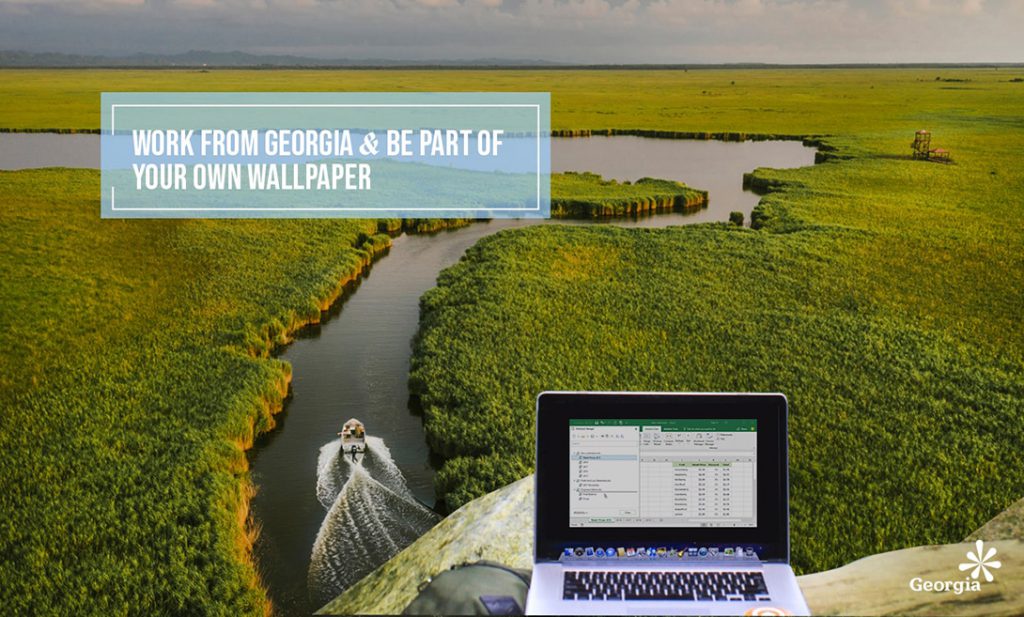Remotely from Georgia – are the digital nomads flocking yet?
When first presented, Remotely from Georgia was touted as a strategy to make up for fallen tourist numbers. But how many digital nomads, individual entrepreneurs and remote workers have actually entered Georgia on the program, and what has been their experience so far?
Juan Carlos Restrepo Cantor, originally from Colombia, was working in Norway on an exchange from his university in Iceland when COVID-19 hit. With the pandemic complicating his Norwegian visa, he started looking for digital nomad-friendly countries. He first settled on Vietnam, but after the pandemic cut that route off, he started looking elsewhere. That’s when Georgia caught his attention.

“I was between Georgia and Ukraine,” Restrepo says, “but my dorm friends in Norway (who were Russian and Azerbaijani) told me wonderful things about Georgian hospitality and the overall lifestyle. Then I read about the Remotely from Georgia announcement by the Ministry of Economic Development, and that was it.”
Restrepo’s story mirrors a lot of the twists and turns that a lot of international remote workers have been dealing with since the pandemic started. Travel restrictions, visa expirations, and rapidly-changing public health situations have made living abroad considerably more complex than it once was.
Georgia is no exception, as the borders have been closed for most of 2020. That’s where Remotely from Georgia comes in.
What is Remotely from Georgia?
Remotely from Georgia, run by the Georgian National Tourism Administration (GNTA) and the Ministry of Economic and Sustainable Development (MOESD), allows remote workers to pass the otherwise closed borders with an entry permit—notably not a visa. The only major condition is that they must earn at least $2,000 a month. Given that Georgia grants a year of visa-free stay to around 95 countries, this scheme has proven particularly attractive to people looking for a long-term home base during the pandemic.
This was precisely the case for Jack Howard, a digital designer from Australia, who had been planning a bike trip from Ireland to India with his partner when the pandemic hit. “I researched all our options for visas,” he says, “but Georgia’s program really stood out to me for its simplicity, and the fact that we read [that] expats and nomads online speak so highly of the country.”
How does Remotely from Georgia work?
Everyone visiting Georgia through the Remotely from Georgia program goes through the same basic process:
- Fill out the official application form at registration.gov.ge.
- Get an approval, rejection, or follow-up asking for more information.
- Enter Georgia using the documents provided.
- Quarantine for 8 (or more) days in a government-approved quarantine hotel.
- Once quarantine is over, visitors are free to (safely!) enjoy Georgia for as long as their visa allows.
Most applicants feel the process is fairly easy to get through, like Steve Avila, an American who came to Georgia on the program. “Honestly, it’s a very straight-forward process,” he says. “You just submit the documents they ask for and that’s it. I got notified less than ten days later.”
Is Remotely from Georgia making a difference?
Border closures due to the pandemic have decimated Georgia’s previously booming tourism sector: compared to 2019, the first nine months of 2020 saw over a 77% decrease in international visitors, according to the GNTA.
Remotely from Georgia is intended to open up travel specifically for individuals with higher spending power, who, as the government press release says, “will have the means and the opportunity to travel to different parts of the country with their family members, to make use of various services, and to get acquainted with the local culture and cuisine, which will facilitate the rapid recovery of our private sector.”
So, how’s it going? According to the Ministry Of Economy and Sustainable Development (MOESD), the program received 1,350 applications between August 27 and November 24, of which approximately 950 (70%) were approved and 150 (11%) were rejected. The remaining 250 applications are presumably being processed. Of the 950 approved applications, 417 applicants had entered Georgia as of November 24.
While this doesn’t add up to much compared to previous tourism numbers, the length of each visit is likely to be substantially longer than the average 4.1-night stay of 2019 visitors. With participants often staying six-plus months in the country, their economic impact is likely to far exceed the average tourist, even if they participate in fewer traditional tourism activities.
Another minor boost is that the program allows incoming workers to bring a plus-one or a family with them, meaning that the 950 approved applications actually includes more than 950 potential entrants.
People from almost 60 different countries have sent in applications. A complete list wasn’t available, but, according to the GNTA, these are “among the top”:

Additionally, In October, when only 800 applications had been submitted (versus the 1,350 currently submitted), the GNTA’s figures listed two other countries among the top five. It’s unclear whether these countries remain there:

While the bulk of visitors to Georgia generally come from the neighboring countries of Russia, Azerbaijan, Turkey, and Armenia, applicants to the Remotely from Georgia tend to be more spread-out. This seems to somewhat point to the program’s success in increasing the ratio of high-value visitors entering Georgia. The U.S., for example, only made up 0.5% of visitors in 2019, but weighs in at 18% of participants of the Remotely from Georgia program, and the UK, Japan, and Canada have made similar gains.
Of visitors, 54% registered as self-employed, 29% said they are full-time remote employees, and 17% listed themselves as entrepreneurs.
Many participants had been hoping to come to Georgia before the pandemic, so Remotely from Georgia is simply moving up their timelines and mitigating the Covid-19 tourism slump somewhat.
Others, like Restrepo and Howard, are first-time visitors specifically drawn here by the program, which points to the campaign’s success in maintaining the country’s travel profile.
Georgia was already on the map for the digital nomad community, though the 2020 Nomad Summit was pushed to 2021 due to the pandemic, and the Remotely from Georgia program has gotten numerous mentions in nomad groups and publications. All this makes the short-term economic stimulus only a part of the program’s potential impact, as its help in maintaining awareness of Georgia as a travel destination may have post-pandemic payoffs.
Workers who spend over six months in Georgia will also technically be tax residents, and some may end up taking advantage of Georgia’s business-friendly environment. This is certainly something Georgia could encourage by providing information on tax and business options, but in the meantime, this gap is largely being filled by private organizations like ExpatHub and Sigma Group.
Tom Williams, a managing partner at ExpatHub, says the program “has definitely led to an influx of interest and new enquiries to our team at ExpatHub both from those who will be here temporarily, as well as many who are actively considering Georgia’s low cost of living, great hospitality and low taxes as an incentive to stay longer than the initial six to 12 months that they may have originally planned.”
Why Georgia?
Stefania Guglielmi, a travel blogger from Italy, had visited Tbilisi for a few months before the pandemic, then decided to return some time later on the Remotely from Georgia Program. “Georgia,” she writes, “boasts some features that are particularly attractive for digital nomads. A low cost of living combined with a high quality of life, a low taxation rate, and a growing expat community are a few of them.” While food, wine, and nature are big draws for conventional tourism, long-term remote workers also tend to look for infrastructure and accessibility.
David Morris, a traveler from the United States, was also looking for a good place to stay while the pandemic continued to limit world travel. “I was in Georgia three times last year and loved my experience,” he says, “especially the wine and hospitable people. Knowing I could stay one year made this a simple decision. Ordinarily, I would avoid winter and not stay longer than three months, but these are not ordinary times.”
Andie Eggimann, who came to Georgia with her husband and children, has been drawn to Georgia since before the pandemic, though. “I fell in love with Georgia on a trip exactly two years ago this October,” she says. “At that time, my husband and I did not work remotely, but I loved Tbilisi as a city and it has always been a dream of ours to live in the mountains and make wine.”
Starting a business is an item on quite a few people’s lists, like Edward Whitehead, a South African coming from Turkey. He’s actually considering multiple ventures, including a Georgia-based IT consultancy firm and an app for cleaning services.
With Georgia ranking 7th overall in the World Bank’s 2020 Ease of Doing Business rankings and 2nd in the world for ease of starting a business, it’s easy to see why starting a business is one of the topics on remote workers’ minds. Easy registration and favorable tax rates have made Georgia a destination even for those who might not have otherwise considered starting a business.
Caleb Fornari, who was accepted, but ended up not taking advantage of the program due to his Filipina girlfriend not being eligible, sees potential in the tech space. “I did hope to perhaps hire a few programmers and start a small office for my software business in Tbilisi,” he says.“The tax rates are very reasonable, and while the talent pool is small, Georgia has some very dedicated and talented programmers.”
For Igor Jovic, a digital nomad from Serbia, Georgia’s other perks make doing business here an obvious choice. “For anyone who can live here for six-plus months per year, it makes no sense to NOT register a business here and become a tax resident in Georgia,” he says. “A healthy expat scene, amazing scenery and food, and the best of all–how much you save in taxes… What’s there not to like?”
Challenges
As with any program, there have been a few issues with Remotely from Georgia—though most travelers see them as relatively minor.
By far, the most-cited issue was a lack of communication and information. Like many others, Tetiana Voloshyna recommends that applicants check Facebook groups for information, though she herself arrived before there was a lot of information available online. “They don’t reply to your e-mails,” she says, and calling isn’t much better: “When they answer and hear a question in English, they hang up… or you reach them and ask a question, but they don’t know the answer.”
Though this is definitely an issue—and our attempts to contact Remotely from Georgia through official channels also failed—it’s not a dealbreaker. As Jack Howard says, “We did have some trouble getting responses from the official e-mail address, but that’s pretty understandable seeing as there seems to have been a lot of interest and they would be receiving a pretty huge volume of enquiries.”
Tom Williams agrees, citing the program’s impressively fast rollout as a factor behind the information issues. “Overall,” he says, “I consider the program to be successful but understaffed.”
Another concern is the protocol for managing an entrant with a positive Covid-19 test. David Morris, the first (and so far, only) known case had a fairly negative experience, as he was moved to a hotel with poor living conditions, no heat, and no English-speaking staff. As he was asymptomatic, he requested a second test to check for a false positive, but it wasn’t allowed.
Fortunately, his situation improved after he posted on social media and contacted his embassy, attracting the notice of the GNTA. After being released, he remains upbeat and says he is “free now and already enjoying my time in Tbilisi.” Whether or not the procedure has changed since Morris’ experience, though, is not clear.

Covid-19 concerns
When Remotely from Georgia opened applications in August, Georgia was seeing a few dozen cases of Covid-19 per day. By November, it was often exceeding 3,000.
This has probably impacted travelers’ interest in the program, but those who spoke to Investor.ge were generally sanguine (though the sample is biased toward those who decided to enter). Jack Howard and his partner considered staying in Turkey, but ultimately decided that taking precautions in Georgia would be sufficient. “This winter will be tough for the whole region, not just Georgia,” Howard says, “and we knew that coming in.”
Igor Jovic also came, but a bit more reluctantly. “Since I already applied, got it all planned out, I figured I might as well just fly out, but if these numbers were present at the application time, I’d probably have waited until spring.”
The future of Remotely from Georgia
How long Remotely from Georgia runs depends on how long it’s needed. Ideally, Georgia will be able to open its borders soon, and normal travel and tourism can resume.
Until then, the program will likely continue to appeal to travelers looking for open destinations in a restricted global travel environment. The willingness of the Georgian government to welcome long-term remote workers is also noteworthy, as it could potentially blossom into a more comprehensive scheme supporting this type of traveler. Remotely from Georgia has been a success so far, and regardless whether it changes form or simply shuts down after the borders reopen, it’s certainly helped boost Georgia’s reputation as a travel, work, and business destination.
____________________________ ADVERTISEMENT ____________________________


